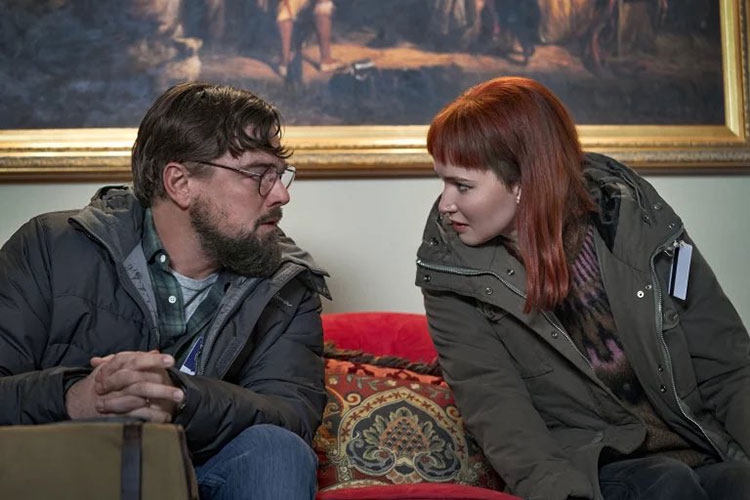The following questions and answers are excerpted from a conversation that followed the NBR screening of Don’t Look Up.
How did you arrive at the very specific tone of the film?
Adam McKay: It was always going to have comedic elements to it. But in the editing process, the tone was very tricky. So we were constantly dialing it up and down and sideways… and kind of tweaking it. It was always going to be funny and have satyrical undertones to it, but in the end — once we really started finding the right kind of rhythm and feeling to it — parts of it got a lot funnier.
the President of the United States did legitimately float the idea of ingesting bleach
Is it true that you had to go back into the script during the pandemic and make it 15% crazier?
AM: I’ve always felt that this time that we live in is such a strange mixture of feelings. I was saying the other day that it’s sort of like living during the peak of the Cuban missile crisis while at the same time being in the greatest time-share presentation ever. So you’re being sold to constantly, yet there are these seismic, massive issues that are going on. Obviously I wrote the script before covid and the pandemic, and then was kind of gobsmacked at how crazy some of the reactions got to a really serious situation. So I did have to go back and tweak the script. And it wasn’t anything major— it was certain lines of dialog, the comet-denial was always in the script, but I pushed that a little bit further, along with some of the reactions from the President and the powers that be. Yeah, it was an interesting thing to try to do! And then once we started screening the movie (it’s a pretty wild one, obviously)… We did a couple test-screenings (for vaccinated, distanced audiences) and they would sort of react as if the movie was too crazy! And it became this very interesting exchange between how people are viewing reality versus how reality really is (how strange reality really is), and what the common experience of that is for a movie audience. It was definitely like no other movie I’ve worked on, and I’ve worked on some movies that play with tone quite a bit! But this was the most challenging. For example, regardless of who you voted for… the President of the United States did legitimately float the idea of ingesting bleach (on national television) to deal with covid. Once a moment like that happens… where are you, exactly, in terms of your relationship with reality? It was strange, because we were sort of working the movie itself while working the audience’s connection with the movie, while dealing with our own experience of reality. All I can say is, thank God my editor Hank Corwin is brilliant and very very patient.
Your films always involve some degree of improvisation. How did that work in this instance?
AM: Everyone knows the way I work, I like a lot of improv. But Jonah may have improvised one of my favorite moments in any movie I’ve ever done, which is his “prayer for stuff,” towards the end of the movie. He did one take where he threw out the idea and I was like, “Jonah, you have to do that.” And sure enough, it ended up becoming one of my favorite scenes in the movie. Talk about summing up an era! “There are a lot of people out there praying for people, and I commend that… but I want to say a prayer for stuff. Dope apartments, sick cars…” I was on the floor. When it comes to Jonah, you go back and forth but ultimately you trust his instincts, they’re always so good.
There are several cathartic moments in the film that just feel great for the audience, and really leave a lasting impression. Can you talk about those scenes?
AM: I had the same feeling when we were filming those scenes. And it really made me think about the fact that, God, everything we encounter these days is so poll-tested and focused-grouped… and that everyone… when you hear from our leaders, when you look at the way people express themselves, it’s all being filtered through some sort of degree of, “what will play? What will not play?” And we’re so used to a kind of particular cadence. You can hear it when you listen to debates or when you listen to our leaders speak. They speak in this way that has a certain tone, because that’s become the accepted way to “communicate” with a mass-audience, and that style has poll-tested very well. And the same thing, to some degree, applies to broadcast journalism, by and large. When we filmed those scenes, there was such a release… you could feel it even from the crew, when Leo [DiCaprio] cut loose, when Jen [Lawrence] cut loose, we were all hungry for a degree of real, honest, emotions and real anger and real fear. Real righteousness. Usually when you film, you hope to have some of the feeling of what’s going to end up being in the final cut. But in those instances, we felt it on the days we shot them, too. It was exciting for us.

